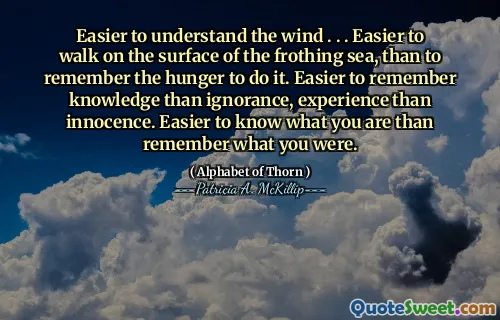
Easier to understand the wind . . . Easier to walk on the surface of the frothing sea, than to remember the hunger to do it. Easier to remember knowledge than ignorance, experience than innocence. Easier to know what you are than remember what you were.
This quote delves deeply into the nature of human memory, perception, and identity. It suggests that some aspects of experience and understanding are inherently easier to grasp than to recall or relive with full authenticity. For example, understanding the wind or walking on turbulent seas symbolizes natural, visceral experiences that are more straightforward in their symbolism than recalling the nuanced desire or passion that drove someone to undertake those efforts. The contrast between knowledge and ignorance, experience and innocence, highlights how acquired understanding often feels more accessible than the naive states we once inhabited, yet it can distance us from the authenticity of those earlier impossibilities or pure sentiments. The phrase 'easier to know what you are than remember what you were' underscores the idea that self-awareness and current identity are often clearer than the memories of one's past self, which may be obscured or idealized over time. It invites reflection on the way we perceive our journey—how certain experiences become integrated into our present understanding, while the raw essence of childhood or initial pursuits can fade, replaced by accumulated knowledge. This bittersweet observation underscores the complex interplay between memory, self-perception, and the ongoing process of growth. By acknowledging that some aspects of experience are more tangible in the moment than in recollection, the quote encourages appreciation of lived experience and self-awareness in the present, rather than yearning for the clarity of past innocence or unspoiled ignorance.






